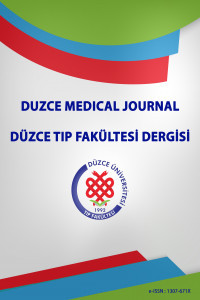COVID-19 Yoğun Bakım Ünitesi ve Genel Yoğun Bakım Ünitesi Personelinin Ruhsal Durumunun Karşılaştırılması
Anksiyete, COVID-19, depresyon, korku, ruh sağlığı, yoğun bakım
Comparison of the Mental Status of COVID-19 Intensive Care Unit and General Intensive Care Unit Staff
Anxiety, COVID-19, depression, fear, mental health, intensive care,
___
- who.int [Internet]. World Health Organization. Mental health and psychosocial considerations during the COVID-19 outbreak. 2020 [Cited: 2020 June 27]. Available from: https://www.who.int/docs/default-source/coronaviruse/mental-health-considerations.pdf.
- Styra R, Hawryluck L, Robinson S, Kasapinovic S, Fones C, Gold WL. Impact on health care workers employed in high-risk areas during the Toronto SARS outbreak. J Psychosom Res. 2008;64(2):177-83.
- Ho SM, Kwong-Lo RS, Mak CW, Wong JS. Fear of severe acute respiratory syndrome (SARS) among health care workers. J Consult Clin Psychol. 2005;73(2):344-9.
- McAlonan GM, Lee AM, Cheung V, Cheung C, Tsang KW, Sham PC, et al. Immediate and sustained psychological impact of an emerging infectious disease outbreak on health care workers. Can J Psychiatry. 2007;52(4):241-7.
- Matsuishi K, Kawazoe A, Imai H, Ito A, Mouri K, Kitamura N, et al. Psychological impact of the pandemic (H1N1) 2009 on general hospital workers in Kobe. Psychiatry Clin Neurosci. 2012;66(4):353-60.
- Shen X, Zou X, Zhong X, Yan J, Li L. Psychological stress of ICU nurses in the time of COVID-19. Crit Care. 2020;24(1):200.
- Albott CS, Wozniak JR, McGlinch BP, Wall MH, Gold BS, Vinogradov S. Battle buddies: Rapid deployment of a psychological resilience intervention for health care workers during the COVID-19 pandemic. Anesth Analg. 2020;131(1):43-54.
- Malhotra N, Gupta N, Ish S, Ish P. COVID-19 in intensive care. Some necessary steps for health care workers. Monaldi Arch Chest Dis. 2020;90(1):1284.
- Wu PE, Styra R, Gold WL. Mitigating the psychological effects of COVID-19 on health care workers. CMAJ. 2020;192(17):E459-60.
- Ahorsu DK, Lin CY, Imani V, Saffari M, Griffiths MD, Pakpour AH. The fear of COVID-19 scale: Development and initial validation. Int J Ment Health Addict. 2020;[Epub ahead of print]. doi: 10.1007/s11469-020-00270-8.
- Satici B, Gocet-Tekin E, Deniz ME, Satici SA. Adaptation of the fear of COVID-19 scale: Its association with psychological distress and life satisfaction in Turkey. Int J Ment Health Addict. 2020;[Epub ahead of print]. doi: 10.1007/s11469-020-00294-0.
- Lovibond PF, Lovibond SH. The structure of negative emotional states: comparison of the depression anxiety stress scales (DASS) with the beck depression and anxiety inventories. Behav Res Ther. 1995;33(3):335-43.
- Yılmaz Ö, Boz H, Arslan A. The validity and reliability of depression stress and anxiety scale (DASS-21) Turkish short form. Res Financial Econ Soc Sci J. 2017;2(2):78-91.
- Demirbilek Y, Pehlivantürk G, Özgüler ZÖ, Alp Meşe E. COVID-19 outbreak control, example of ministry of health of Turkey. Turk J Med Sci. 2020;50(SI-1):489-94.
- saglik.gov.tr [Internet]. Republic of Turkey Ministry of Health. COVID-19 information page. [Cited: 2020 July 1]. Available from: https://covid19.saglik.gov.tr/.
- Yıldırım Baş F. The importance of vaccination in the pandemia and COVID-19 vaccination studies. Med J SDU. 2021;(ozelsayi-1):245-8.
- Lai J, Ma S, Wang Y, Cai Z, Hu J, Wei N, et al. Factors associated with mental health outcomes among health care workers exposed to coronavirus disease 2019. JAMA Netw Open. 2020;3(3):e203976.
- Chew NWS, Lee GKH, Tan BYQ, Jing M, Goh Y, Ngiam NJH, et al. A multinational, multicentre study on the psychological outcomes and associated physical symptoms amongst healthcare workers during COVID-19 outbreak. Brain Behav Immun. 2020;88:559-65.
- Reznik A, Gritsenko V, Konstantinov V, Khamenka N, Isralowitz R. COVID-19 fear in Eastern Europe: Validation of the fear of COVID-19 scale. Int J Ment Health Addict. 2020;[Epub ahead of print]. doi: 10.1007/s11469-020-00283-3.
- García-Reyna B, Castillo-García GD, Barbosa-Camacho FJ, Cervantes-Cardona GA, Cervantes-Pérez E, Torres-Mendoza BM, et al. Fear of COVID-19 scale for hospital staff in regional hospitals in Mexico: a brief report. Int J Ment Health Addict. 2020;[Epub ahead of print]. doi: 10.1007/s11469-020-00413-x.
- Öğütlü H. Turkey's response to COVID-19 in terms of mental health. Ir J Psychol Med. 2020:37(3):222-5.
- Greenberg N, Weston D, Hall C, Caulfield T, Williamson V, Fong K. Mental health of staff working in intensive care during COVID-19. Occup Med (Lond). 2021;71(2):62-7.
- Bukhari EE, Temsah MH, Aleyadhy AA, Alrabiaa AA, Alhboob AA, Jamal AA, et al. Middle East respiratory syndrome coronavirus (MERS-CoV) outbreak perceptions of risk and stress evaluation in nurses. J Infect Dev Ctries. 2016;10(8):845-50.
- McHenry J, Carrier N, Hull E, Kabbaj M. Sex differences in anxiety and depression: role of testosterone. Front Neuroendocrinol. 2014;35(1):42-57.
- Arı M, Duman T. COVID-19 and mental health. Duzce Med J. 2020;22(Special Issue):19-22.
- Altun F. How the COVID-19 pandemic, the crisis of the century, impacted social life and women’s socio-economic status. Marmara Univ J Women Gend Stud. 2021;5(1):51-73.
- Huang JZ, Han MF, Luo TD, Ren AK, Zhou XP. [Mental health survey of medical staff in a tertiary infectious disease hospital for COVID-19]. Zhonghua Lao Dong Wei Sheng Zhi Ye Bing Za Zhi. 2020;38(3):192-5. Chinese.
- Yayın Aralığı: Yılda 3 Sayı
- Başlangıç: 1999
- Yayıncı: Düzce Üniversitesi Tıp Fakültesi
Kemik Metaplazisinin Eşlik Ettiği İnflamatuar Rektal Polip: Ayrı Bir Antite mi?
Cansu BENLİ IŞIK, Hatice ÖLGER UZUNER, Mustafa BAKIRTAŞ, Ahmet SARAC
Esra AYDIN SÜNBÜL, Pınar ŞEN GÖKÇEİMAM, Mehmet ÜSTÜNDAĞ, Nihal TAŞTEKİN, Füsun MAYDA DOMAÇ, Hüseyin GÜLEÇ
Önder KİLİÇASLAN, Didem KIZMAZ İŞANÇLI, Esmanur FİL, Ecem ERTÜRK UZUNDAL, Adem KARBUZ
Tolga AKSAN, Ateş KARATEKE, Orkun UZUNEYÜPOĞLU, Muhammed Beşir ÖZTÜRK, Mehmet KÜÇÜKBAŞ
Çocukluk Çağında Hemofilik Artropati: Patofizyoloji, Tanı ve Tedavi
Periferik Sinir Yaralanmalarında Kotinin Etkileri: Deneysel Bir Çalışma
Rıfat AKDAĞ, Ali DALGIÇ, Gülnur TAKE, Uğur SOYLU, Emin ÇAĞIL
Maternal Hidronefrozlu Gebe Kadınların Klinik Seyri: Retrospektif Klinik Çalışma
Barış SAYLAM, Aysun EFESOY, Erim ERDEM
Jafar FATAHİ ASL, Kiarash SHİRBANDİ, Anahita REZAİE, Shahrzad RASTEGARPOUR, Shamim PAHLAVANİ, Akram AHANGARPOUR, Maryam DASTOORPUR, Esrafil MANSOURİ
Şiddetli COVID-19’lu Ergende Konvalesan (İmmün) Plazmayı İzleyen İntravenöz İmmünoglobülin İnfüzyonu
Öner ÖZDEMİR, Bahri ELMAS, Mehmet Cemal DÖNMEZ, Hüseyin SÜTLÜOĞLU
Gökhan ALICI, Alaa QUİSİ, Omer GENC, Hazar HARBALIOĞLU, Samir ALLAHVERDİYEV, Abdullah YILDIRIM, Örsan Deniz URGUN, Mustafa GÜR
